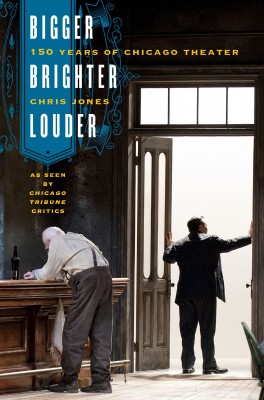Bigger, Brighter, Louder
150 years of Chicago Theater
As seen by Chicago Tribune Critics
By Chris Jones
Published by The University of Chicago Press
Chicago, IL 60637
ISBN-13-978-0-226-05926-6
376 pages
Nonfiction> theater oriented
150 years of Chicago Theater through the eyes of Chicago Tribune critics is a fascinating glimpse into the Chicago theater heritage
The present day Chicago Tribune drama critic. Chris Jones, has done his homework as he has assembled 101 theater reviews and articles to tell the story of the growth of Chicago theater. This intriguing work is much more that a compilation of theatre reviews from the sixteen Chicago Tribune Drama critic from 1853 through 2012. With comments by the present drama critic, still employed by the Chicago Tribune, Chris Jones bravely, with much candor, puts each review into its historical context as well as giving us Jones’ honest assessment of the review and the reviewer.

The 101 Reviews include a bio of the 16 drama critics and their influence on Chicago theater. From George Putnam Upton 1868 review of Joseph Jefferson’s Rip Van Winkle to Percy Hammond – “one of the first newspaper’s critics whom readers actually followed by name” to the articles and reports about the 1903 Iroquois Theater fire during the performance of Eddie Foy in Bluebeard, we see how both Chicago and its newspaper coverage helped mold the theater scene eventually into the ‘Chicago Style theater’ we know today.
We learn about several Tribune critics who were outspoken and candid about theater. Charles Collins, drama critic at the Tribune from 1930-38, was anti -New Deal conservative who hated Tobacco Road calling it “the cussingest plat that has ever been staged.” His review got Chicago Mayor Kelly to get the show banned for “outrageous obscenity.” Collins called Clifford Odets’ Waiting for Lefty “Red Propaganda.” But it was a lady reviewer who had the strongest influence on the development and the standards of Chicago theater.
Claudia Cassidy was the Tribune’s drama, music & opera critic from 1942 to 1965. She ushered in the golden age of theater criticism at the Chicago Tribune. Jones calls her “the most notorious critic in the history of the newspaper.” She was know for her high standards and she loathed substandard touring productions that came to her city! Jones refers to her as “sharped-edged, witty, perennially unforgiving, occasionally cruel.” Her reviews “sparked outrage; many changed lives; many made or broke careers.” She terrified touring producers; was known as “Acidy Cassidy’ or “that woman at the Tribune.” Whether it was a review or her column “On the Aisle,” she never lowered her standards and she constantly promoted the need for a strong Chicago resident theatre ensemble. She championed Tennessee Williams’ work and her review of Williams’ The Glass Menagerie launched his career. Jones reports that Cassidy “went back to see Menagerie on three successive nights (unimaginable today!)”

Indeed, Chris Jones mounts 33 Cassidy reviews in this volume, a fitting statement to Claudia Classidy’s influence. These are terrific reads! Who can resist a review with the headline: “When an Audience Boos and Demands Its Money Back–How Bad Can Opera Get?”
We read attacks and rebuttals toward Cassidy from Arther Miller, well-know actors and many producers as well as Cassidy’s replies. Fascinating! One of my favorite Cassidy articles from page 159 “Amplifying Theater for Chicago Piece, With Sights on the Moon,” where she quotes Daniel Burnham:”Make No Small Plans.” Jones calls this telling article her “manifesto for the creation of a vibrant theater in Chicago.” It was written by Cassidy in 1955.
While Chicago theater was growing and inventing small storefront theaters, we see that development through the reviews those who came after Cassidy including Will Leonard, Linda Winer, Roger Dettmer and Larry Kart. These drama critics discovered the rise of such entities as the Goodman Theatre, the Body Politic, Hull House, Kingston Mines Theatre, Forum Theatre, Organic Theater, St. Nicholas Theater and Court Theatre. Unfortunately, Jones barely mentions Candlelight Theatre and there is no mention of the suburban Drury Lane Theatres or the Marriott Theatre despite their contribution to regional productions of Broadway musicals and comedies.
But Jones does cover the reign of Richard Christiansen the Tribune’s drama critic from 1979 to 2002. He championed the Steppenwolf Theatre; loved William L. Petersen; praised a young Robert Falls; helped launch David Mamet; loved Deanna Dunagan. Christiansen loved small fledgling theater companies. He was an admired ‘friend of theatre’ who, Jones states; “When he loved a show, he had a knack of writing in such a way that sent people to the theater.” (That should be the underlying purpose of all positive reviews.) One of his last contributions to theater was his praise for The Producers in 2001. He also helped the career of director Gary Griffin with his admiration of Pacific Overtures. Richard Christiansen loves theatre and he was proud to see even the smallest storefront productions. He was the complete opposite of Claudia Cassidy yet both were terrific writers. I still see him at shows.
To replace Christiansen, the Tribune brought in Michael Phillips from the LA Times. He lasted a few short years as he found his home as the Tribune’s film critic. In 2007, Chris Jones emerged as the chief theatre critic. Jones’ rave of August Osage Country (by Tracy Letts) helped get that terrific work to Broadway. In Jones’ rave of Keith Huff’s A Steady Rain. he notes was yet another ‘Chicago style drama that speaks ‘Chicago’ to the world. Chris Jones establishes his in depth knowledge of theater and his eloquent writing in his review of The Iceman Cometh in 2012. In his comments Jones states: Robert Falls’ The Iceman Cometh had a “Chicago-style focus on actors who understand the working, drinking stiff.” With Jones’ eloquence, The Tribune is in good hands as the chief drama critic. This volume speaks to his knowledge of both history and theatre. I have only mentioned a few highlights here. This read is filled with rich history, facts and antidotes. Jones has done terrific research.
“Bigger, Brighter, Louder” is a must read for all theater lovers; for all young Thespians; and for all critics. I thought I knew a few things after seeing and writing 3,000 reviews over the last 12 years but I learned much from Chris Jones’ terrific book. This book should be required reading before anyone writes another theater review.
Highly Recommended
Tom Williams
Date Reviewed: November 24-December 2, 2013
Listen to my interview with Chris Jones: https://www.theatreinchicago.com/talk//interior.php?podshowID=435
